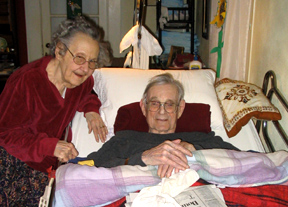Bernice and Carl, Near the End of 2005

Bernice and Carl, Near the End of 2005

As Carl's health declined, he spent the last five years of his life bed-ridden. There's nothing desirable about this, but as usual for him, the dark clouds of the situation had their silver linings. Carl required some brief periods in the hospital and several months in a nursing home, but he was able to spend most of his last years in the house where he had lived since the age of 2. The living room of the house was converted into something like a hospital room, with special bed and support systems, but none of the cold, impersonality a more standard end-of-life environment would have enforced on him.A life-long nurse, Bernice devoted herself to his care in his last years. She had a bed a few feet away from his and tended to his needs with attention, detail, and a wealth of experience few people receive in any medical setting or situation, let alone their end phase. If their marriage had begun in war and their lives created paradigms of mutual support, parts of the last stage may have been in odd ways the most idyllic, the most exemplary, and the closest.
Dying alone is one of the strongest fears humans experience. Carl was free from such fears. One of the reasons for this was the way he had moved closer, not always through easy stages, to spiritual peace through his life.
During his last days, Carl frequently talked to his son about where he had been in the last minutes or hours. He spoke about seeing family (particularly his mother, Anna, and brother, Harold) and holding conversations with them at times when he seemed asleep to those in the room with him. The skeptical might dismiss this talk as dream or delusion. Others might see it in a different way: this was a time when he was a commuter.
Nurses aids from Society's Assets did an excellent job of keeping him clean and feeling physically fresh during his last weeks. Karl, Jr. arranged for a physician to tend to Carl at home, and other specialists assisted him in this period. Hospice workers kept him relatively pain-free. He had a harrowing cough for several weeks before the Dr. was brought in, and this was aleviated during his last weeks by the doctor's care. There had been difficult months toward the end of his life and the last phase wasn't free from these, but for significant stretches of the final weeks Carl's passing was as gentle and as free from pain or fear as drifting into a nap. John Donne's poem, "A Valedicton: Forbidding Mourning," a poem Carl particularly liked, opens with the lines:
As virtuous men pass mildly away,Many virtuous men and women pass away in much less than a mild fashion. Carl was one who did.
And whisper to their souls to go. . .
Bernice had made arrangements for his cremation and burial years before. Her parents repose in the military cemetery at Fort Leavenworth, Kansas. Bernice wished to be buried with her parents and to rest with Carl by her side. The couple wished for no local funeral or memorial service. Carl was buried in the military cemetery shown below.